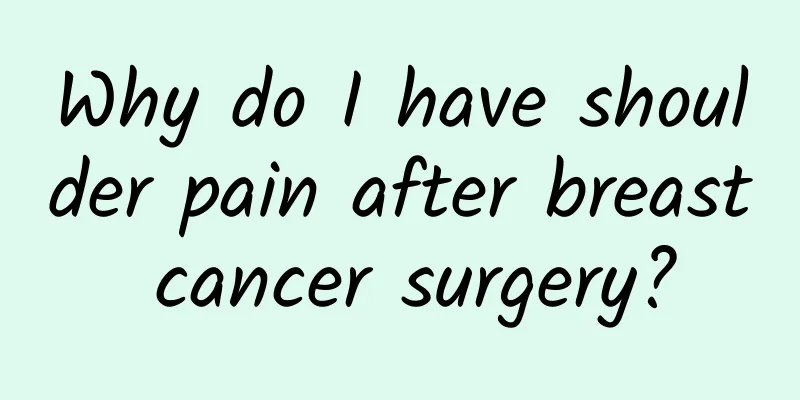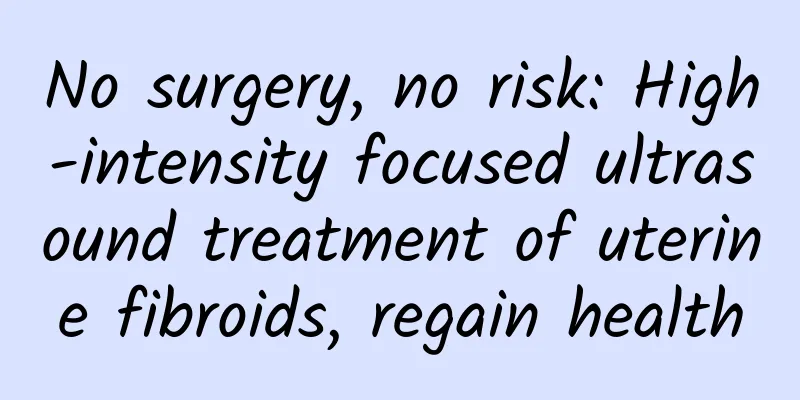Why do I have shoulder pain after breast cancer surgery?

|
Women don’t want to lose their breasts. Even if they have breast cancer, they still wonder if there is a way to preserve their breasts. This is especially true for the actress Ye Fan, who is known as the “Queen of TV Dramas.” This actress, who sang theme songs and ending songs for many TV dramas, such as “Dragon and Phoenix,” “Legend of Chu Liuxiang,” “Burning the Afang Palace,” “Zhou Enlai in Shanghai,” and “Women’s Special Police Team,” once sang “Dear China, I Love You” on CCTV’s Spring Festival Gala in 2001. The singer, who made people hum “Meeting You Is My Fate,” was diagnosed with breast cancer in 2003, and she chose breast-conserving surgery at the time. In the end, due to erosive metastasis caused by breast cancer, she suffered from liver failure accompanied by extensive bleeding. After rescue and treatment failed, she died at the age of 37! The following patient also suffered from breast cancer... Ms. Yang, 52 years old, was unfortunately diagnosed with breast cancer two months ago. After undergoing a unilateral mastectomy, she felt that it was inconvenient to move around, and thought that after a major operation, she had to rest before she could get better, so she didn't move much. Not long ago, Ms. Yang suddenly found that her left arm was swollen and she could not lift it at all. When she raised her hand slightly, she felt a piercing pain in her shoulder. In fact, there are many people like Ms. Yang. Most breast cancer patients think that bed rest can speed up recovery after resection surgery, but what they often get is shoulder pain and restriction. 1 Why do I have shoulder pain after mastectomy? Many patients who have undergone mastectomy may not understand why they experience shoulder pain. This is not only related to the anatomical relationship between the breast and the shoulder joint, but also requires understanding one of the characteristics of surgery, which is direct damage to local soft tissue. Unilateral mastectomy may inevitably cause direct damage to surrounding muscles such as the pectoralis major and minor muscles, as well as nerves, blood vessels, and lymphatic vessels. In addition, the patient himself may keep the upper limbs immobilized for a long time because of fear of pain and affecting wound recovery, resulting in long-term poor movement of the upper limbs and shoulder joints, which makes it easier for the affected upper limb to edema and difficulty in shoulder joint movement. 2 How to perform rehabilitation exercises after surgery? Currently, patients after breast cancer surgery often undergo phased upper limb rehabilitation training. Rehabilitation therapists will provide corresponding training guidance and adopt different rehabilitation training methods according to different periods and stages after breast cancer surgery to promote limb function recovery. Patients can start early rehabilitation training 24 hours after surgery. Postoperatively until the drainage tube is removed During this stage, the patient's incision is less firm, and the main exercises performed are arbitrary active movements of the hand, wrist, and elbow and isometric contractions of the upper arm, including flexion and extension of the finger joints, alternate finger flexion, and flexion and extension of the wrist and elbow joints. Remove the drainage tube until the sutures are removed During this stage, the main exercises for shoulder joint range of motion include active movements of each axis of shoulder flexion, extension, adduction, abduction, internal and external rotation. The shoulder joint can be raised, straightened and flexed 90° to prevent the healing surface of the axillary skin from being too tight. After that, you can gradually transition from the shoulder to the full range of joint movement of the upper arm, such as finger wall climbing, hair combing, arm pressing, etc. Through these exercises, you can increase joint mobility and muscle strength. Encourage and guide the patient to eat, brush teeth, dress, etc. with the upper limb on the operated side. After stitches removal At this stage, the surgical incision is relatively firm, and a wide range of upper limb and shoulder joint activities can be performed appropriately, such as shrugs, upper arm raises, finger wall climbing, and pillow wings. For training the adductor muscles of the shoulder joint, isokinetic strength training can be selected, or a series of progressive resistance training can be performed. Functional exercise is of great significance in preventing intra-articular adhesion caused by long-term shoulder joint immobilization, promoting the formation of loose connective tissue, and reducing the intensity of scar tissue in the surgical field. 3 How to control the intensity of training yourself? Many people may think that the more rehabilitation exercises, the better? The greater the intensity, the better? Xiao H here needs to remind everyone that training should be gradual. Pay attention to avoid fatigue and exercise intensity should be moderate. You should gradually increase the range of motion and amount of exercise, choose the exercise intensity you can tolerate, and avoid obvious fatigue and pain. At the same time, each active or passive exercise should have a stretching feeling and last for a certain period of time. Every time you enter the next stage of stage training, don't forget to complete the training content of the previous stage before entering the next stage of training. Note: There is no copyright issue for the pictures in this article Author: Guo Yisha, Wu Jichun, Bi Xia, Zhao Jiangxia, Zhoupu Hospital, Shanghai University of Medicine and Health Sciences Bi Xia Director of the Rehabilitation Medicine Department of Zhoupu Hospital Affiliated to Shanghai University of Medicine and Medical Sciences, and Vice President of the School of Rehabilitation of Shanghai University of Medicine and Medical Sciences. He was selected into the Excellent Discipline Leader and Leading Talent Training Program of the Pudong New Area Health System in 2010, 2018 and 2019. He has published 4 SCI papers and more than 30 core journal papers as the first author and corresponding author. Professional fields: stroke rehabilitation, fracture postoperative rehabilitation, spinal cord injury rehabilitation, artificial joint perioperative rehabilitation, hand injury rehabilitation, etc. Main academic positions: Member of the Geriatric Rehabilitation Branch of the Chinese Rehabilitation Medicine Association, Member of the Medical and Nursing Integration Committee of the Chinese Rehabilitation Medicine Association, Rehabilitation Committee Member of the Geriatric Rehabilitation Branch of the Chinese Medical Doctor Association, Executive Director of the Shanghai Rehabilitation Medicine Association, Member of the Physical Medicine and Rehabilitation Branch of the Shanghai Medical Association, Vice Chairman of the Rehabilitation Treatment Committee of the Shanghai Rehabilitation Medicine Association, Member of the Orthopedic Rehabilitation Committee of the Shanghai Rehabilitation Medicine Association, Member of the Spinal Cord Injury Rehabilitation Committee of the Shanghai Rehabilitation Medicine Association, Member of the Community Rehabilitation Committee of the Shanghai Rehabilitation Medicine Association, Member of the Sports Health and Rehabilitation Committee of the Shanghai Rehabilitation Medicine Association, Chairman of the Rehabilitation and Physiotherapy Committee of the Shanghai Pudong New Area Medical Association, and other academic positions. Wu Jichun A therapist at the Rehabilitation Medicine Department of Zhoupu Hospital affiliated to Shanghai Health and Medical College, she holds a master's degree in rehabilitation therapy. She is good at fracture surgery rehabilitation, postpartum rehabilitation and sports rehabilitation. Funded by Shanghai Science and Technology Commission's Science Popularization Project (Project No.: 20DZ2311100) |
<<: C position debut - colposcope
>>: What should we do in the face of Alzheimer's disease?
Recommend
How many times does a woman ovulate in her lifetime?
When is the ovulation period in a woman's lif...
I took the contraceptive pill and my period was dark and dry
Is it normal to have dark and dry menstruation af...
What is the reason why girls have big feet?
There are many natural differences between men an...
Causes of rectouterine effusion
The uterus is a great treasure in the female body...
What kind of pollution is acid rain? How does acid rain acidify the soil?
Acid rain is a complex phenomenon of atmospheric ...
Olive oil has unimaginable effects on women, but 90% of women don’t know it
Women all like to take care of themselves. Olive ...
Which car has lower fuel consumption? Which car has higher fuel consumption?
Many people now prefer cars with lower fuel consu...
I have stomach pain and chest pain. I am pregnant.
Now with the country's opening of the second-...
What exercises can pregnant women do?
After pregnancy, many people mistakenly believe t...
Is it normal to have no fetal heartbeat or embryo at 6 weeks of pregnancy?
After getting married, when the relationship is s...
Why is the leucorrhea thick and bloody?
Women's leucorrhea is very important. Why do ...
Can I drink brown sugar water during menstruation?
We have seen brown sugar water since we were youn...
What are the symptoms of Trichomonas vaginitis?
Some time ago, I learned that many female friends...
What to do if pregnant women have vaginal pain
In our lives, many pregnant women suffer from gyn...
Female reproductive organs
The structure of the female reproductive system i...









